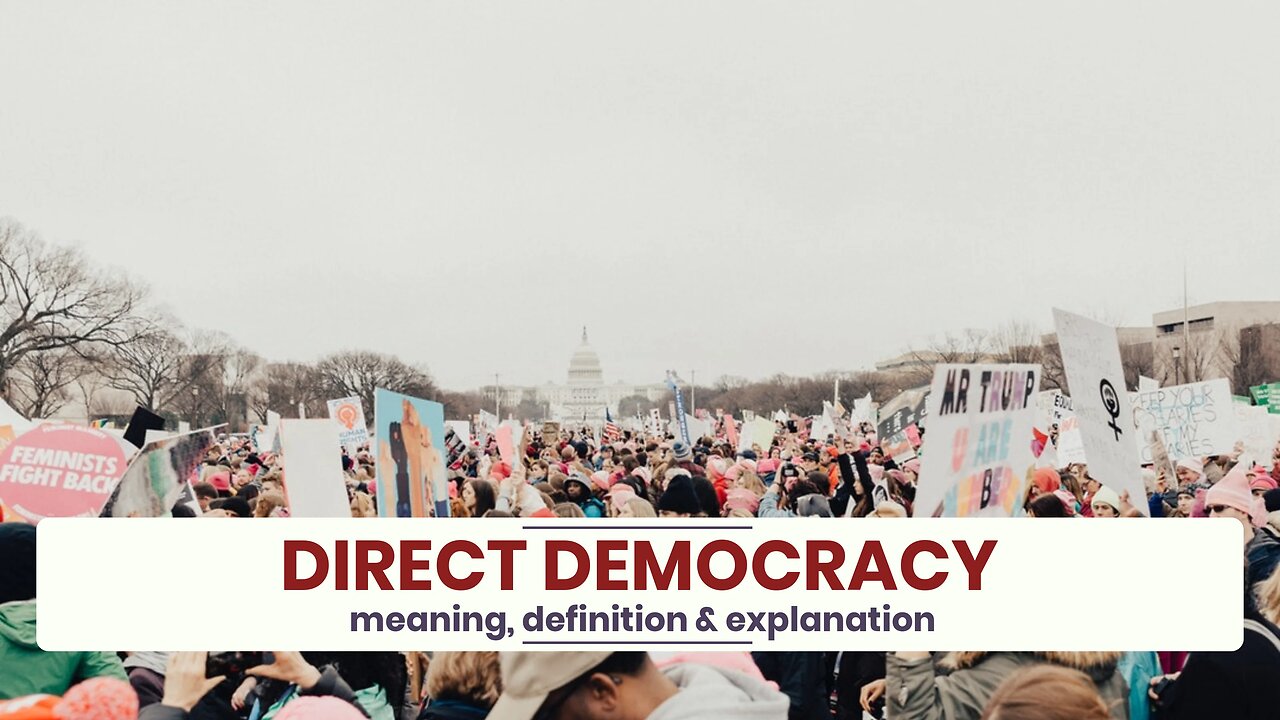Premium Only Content

What is DIRECT DEMOCRACY?
✪✪✪✪✪
http://www.theaudiopedia.com
✪✪✪✪✪
What does DIRECT DEMOCRACY mean? DIRECT DEMOCRACY meaning - DIRECT DEMOCRACY definition - DIRECT DEMOCRACY explanation. What is the meaning of DIRECT DEMOCRACY? What is the definition of DIRECT DEMOCRACY? What does DIRECT DEMOCRACY stand for? What is DIRECT DEMOCRACY meaning? What is DIRECT DEMOCRACY definition?
Direct democracy (also known as pure democracy) is a form of democracy in which people decide (e.g. vote on, form consensus on) policy initiatives directly. This differs from the majority of modern Western-style democracies, which are representative democracies.
Direct democracy is similar to, but distinct from, representative democracy, in which people vote for representatives who then enact policy initiatives.
Depending on the particular system in use, direct democracy might entail passing executive decisions, the use of sortition, making laws, directly electing or dismissing officials, and conducting trials. Two leading forms of direct democracy are participatory democracy and deliberative democracy.
Semi direct democracies in which representatives administer day to day governance, but the citizens remain the sovereign, allow for three forms of popular action: referendum (plebiscite), initiative, and recall. The first two forms—referendums and initiatives—are examples of direct legislation.
Compulsory referendum subjects the legislation drafted by political elites to a binding popular vote. This is the most common form of direct legislation. Popular referendum (also known as abrogative or facultative) empowers citizens to make a petition that calls existing legislation to a citizens' vote. Institutions specify the time frame for a valid petition and the number of signatures required, and may require signatures from diverse communities to protect minority interests. This form of direct democracy effectively grants the voting public a veto on laws adopted by the elected legislature, as is done in Switzerland.
Power of Initiative allows members of the general public to propose specific statutory measures or constitutional reforms to the government and, as with referendums, the vote may be binding or simply advisory. Initiatives may be direct or indirect: With the direct initiative, a successful proposition is placed directly on the ballot to be subject to vote (as exemplified by California's system). With an indirect initiative, a successful proposition is first presented to the legislature for their consideration; however, if no acceptable action is taken after a designated period of time, the proposition moves to direct popular vote. Such a form of indirect initiative is utilized by Switzerland for constitutional amendments.
Power of Recall gives the public the power to remove elected officials from office before the end of their term, although this is very rare in modern democracies.
Some writers with anarchist sympathies have said direct democracy is opposed to a strong central authority, as decision-making power can reside at only one level: the people themselves (through direct democracy) or the central authority. Some of the most important modern thinkers who were inspired by the concept of direct democracy are Cornelius Castoriadis, Hannah Arendt, and Pierre Clastres.
-
 2:24
2:24
The Audiopedia
7 months agoWhat is AUSTERITY?
77 -
 LIVE
LIVE
Adam Does Movies
1 hour agoEmilia Pérez Movie Review - It's Uniquely Awful
154 watching -
 20:07
20:07
BlackDiamondGunsandGear
7 hours agoSPRINGFIELD ECHELON COMPACT / NOT GOOD
10.4K1 -
 LIVE
LIVE
Right Side Broadcasting Network
1 day agoLIVE REPLAY: President Donald J. Trump Holds His First Rally After Inauguration in Las Vegas - 1/25/25
6,920 watching -
 2:55:24
2:55:24
Jewels Jones Live ®
1 day agoWEEK ONE IN REVIEW | A Political Rendezvous - Ep. 107
65.2K24 -
 1:33:29
1:33:29
Michael Franzese
1 day agoTrump Wastes No Time: Breaking Down Trump’s First Week Executive Orders | LIVE
83.4K75 -
 1:26:44
1:26:44
Tactical Advisor
9 hours agoTrump Starting Strong/Shot Show Recap | Vault Room Live Stream 015
61.9K8 -
 10:18
10:18
MrBigKid
5 hours ago $1.27 earnedInsanely Compact Hunting Tripod you HAVEN'T heard of... Revolve
24.9K2 -
 20:29
20:29
marcushouse
12 hours ago $6.48 earnedUnleashing the Power of SpaceX's Starship: Why is it a Big Deal!?
64.1K9 -
 10:46
10:46
Rethinking the Dollar
1 day agoTrump Knows 'The Real Threat' To Your National Security
44.3K13